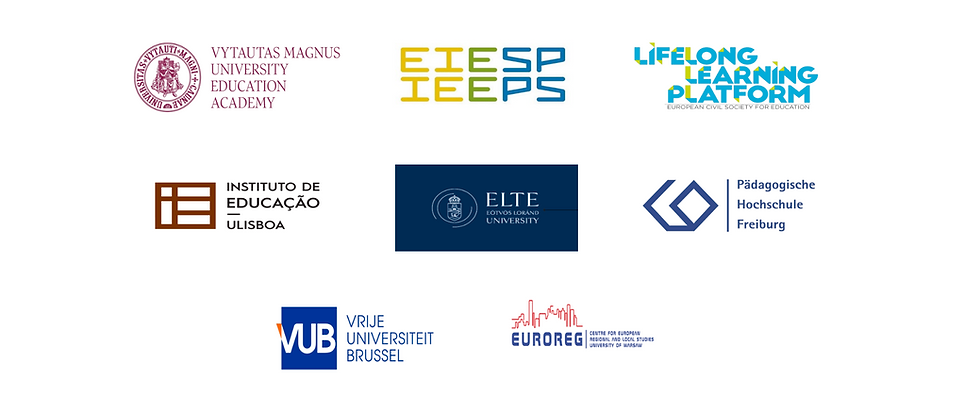The BRiDGE Project
- Maria Gonçalves Ribeiro
- May 6, 2024
- 3 min read
Updated: May 30, 2024
To be effective, education policy research and development needs to be supported by collaboration and critical reflection. The project will address existing gaps between the knowledge and expertise of Higher Education institution-based researchers, practitioners in civil society organisations, and policy-makers, that prevent the effective connection of evidence with policy-making.
The Bridge project brings together a collaborative pan-European professional learning community to support development of competences for policy research. It includes six university-based partners, an umbrella organisation bringing together 48 European networks working in education (LLLP), training and youth, and an international education policy think tank (EIESP). The partners are:
Education Academy, Vytautas Magnus University/VMU) Lithuania (lead partner)
European Institute of Education and Social Policy/EIESP, France (lead content partner)
Lifelong Learning Platform, Belgium
The University of Education, Freiburg (Pädagogische Hochschule Freiburg/PHFR), Germany Faculty of Education and Psychology (PPK)
Eötvös Loránd University/ELTE, Hungary
Doctoral School of Human Sciences, Free University Brussels (Vrije Universiteit Brussel/VUB), Belgium
Institute of Education, University of Lisbon (Universidade De Lisboa/UL), Portugal
Centre for European Regional and Local Studies (EUROREG) University of Warsaw (Uniwersytet Warszawski /UW).
The project design includes development of ‘intra-’ and ‘inter-’ professional learning communities, which will promote interconnected HE systems, as well as offer opportunities for participation in democratic, social and civic engagement through formal and non-formal learning.
The project uses Joint Research Centre’s (JRC) Science for Policy Competence Framework as a foundation for piloting stakeholder seminars and a bespoke training programme for Early Career Researchers in five European HE institutions. Online publications targeted to all three parts of the research-civic-policy knowledge triangle will also be developed.
The specific work packages of the project are:
WP1 Project management: The technical project management will be led by the Education Academy of Vytautas Magnus University, drawing on their strength in having previous Erasmus project leadership experience.
WP2 Development of an intra-professional learning community: education policy research competences for Early Career Researchers: The work package is being led by Universidade de Lisboa (UL), Portugal, who have specific expertise in graduate training and in innovation in policy-making. They are joined by Uniwersytet Warszawski (UW), Poland, Vrije Universiteit Brussel (VUB), Belgium, and Education Academy of Vytautas Magnus University (VMU), Lithuania, in designing and delivering the training programme, with support from Eötvös Loránd Tudományegyetem (ELTE), Hungary. All have expertise as HEIs in the field of education policy research.
WP3 Development of an inter-professional Learning Community: The work package is being co-led by the Lifelong Learning Platform (LLLP) and the Pädagogische Hochschule Freiburg (PHFR), Germany, who have expertise in extensive network facilitation as well as field expertise in supporting collaboration and peer learning in education policy and practice. All partners will be involved in this learning community as it encompasses all stakeholder groups.
WP4 Education Policy Research Publications: This work package will be led by Eötvös Loránd Tudományegyetem (ELTE), Hungary, as they have specific expertise in mentoring doctoral students, including through collaborative approaches to curating and writing high-quality academic publications on education policy, and in mentoring doctoral students producing academic publications.
WP5 Sustainability: This work package will be led by EIESP as they have expertise in forward-looking strategic planning in education and social policy, as well as being ideally placed the ongoing project managers of all work packages in this project.
Over two years, the project will contribute to more active civic engagement in education policy by supporting collaboration between and among different stakeholder groups. It will build their capacity to critically reflect on, interpret and contribute to education policy research. In addition, with its focus on Early Career Researchers, the project is promoting Higher Education international connectivity and future capacity for innovative, high-quality research.
Find out more about the project here.

Co-funded by the European Union. Views and opinions expressed are however those of the author(s) only and do not necessarily reflect those of the European Union or the European Education and Culture Executive Agency (EACEA). Neither the European Union nor EACEA can be held responsible for them.




Comments